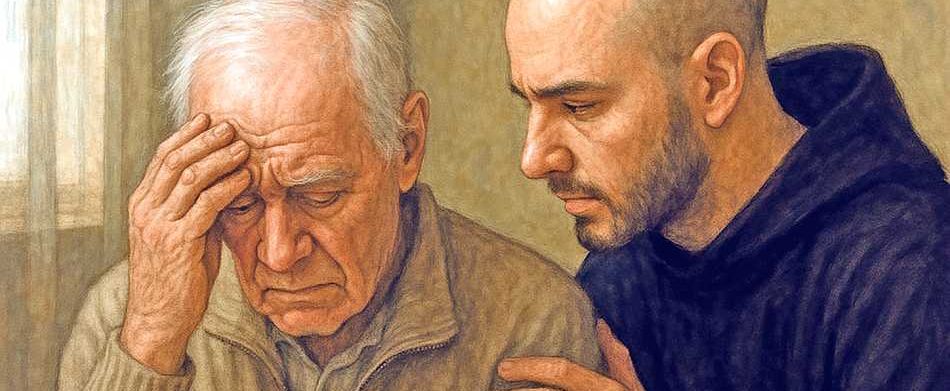Dear Friend,
I write to you with a heavy heart to share something that has deeply affected me. Yesterday, one of my Franciscan brothers, Franco (not his real name), experienced one of the most painful moments imaginable: he had to accompany his father to a retirement home. It wasn’t a simple or sudden decision, but sadly, it had become necessary.
His father has now completely lost touch with reality. He lives in a world of his own – often agitated, sometimes even violent. His disease has taken over, transforming a man who was once a guide and point of reference into a disoriented presence – someone who, at times, becomes aggressive, especially toward his wife, Franco’s mother.
I saw Franco in the refectory shortly after he returned. His face was pale, as if all the life had drained from him. There was a silence about him that spoke louder than words. You could sense that a part of him had remained in that sterile, unfamiliar room where he’d said goodbye – not to his father exactly, but to the man his father used to be.
We often speak of love as something radiant and joyful. But there is also a kind of love that is quiet, persistent and devastating. This is the kind that compels someone to keep caring, even when the person they love no longer recognizes them. This is the kind that endures through rage and confusion, through long nights and impossible choices, and that leads you, with trembling hands, to make a decision that feels like a betrayal, even when it’s the only compassionate path left.
And yet, how invisible the struggle is for those who care for loved ones with dementia or Alzheimer’s. We speak of “aging with dignity,” but often fail to provide the real dignity of support – of shared burdens, of grief that doesn’t need to be hidden behind closed doors.
We don’t talk enough about this kind of pain. Perhaps this is because it’s uncomfortable or forces us to face our own fears – of aging, helplessness and loss. But silence isolates, and isolation deepens suffering. We need communities that don’t just celebrate youth and strength, but also make room for fragility, for care-giving, for slow and painful goodbyes.
I wanted to comfort Friar Franco, to offer something that might ease his pain, but I didn’t know what to say or do. Sometimes words feel useless – like trying to hold back the tide with open hands. So I simply stood beside him, hoping my presence, however small, might ease the burden he carried, even just a little.
That moment stayed with me. It made me wonder: how many others are carrying the same weight in silence? How many sons and daughters, spouses and friends, are walking this path – slowly losing someone they love, without the tools, the support, or even the permission to grieve while their loved one is still alive?
From witnessing what Franco went through, I’ve come to understand that love, in its truest form, is not only in presence, but also in persistence. It is found in hard choices made from compassion, and in tears shed in silence, and in standing by someone when there’s nothing left to say.
Then something occurred to me – simple, but important. I can pray for Franco’s mother and father, and for him too. I may not have the right words to comfort him, or a solution to offer, but I can lift them up in prayer. This is what the Lord himself asked us to do: to carry one another, to intercede, to ask, to trust.
And maybe that’s where we begin – with compassion in our hearts, with one another in our prayers, and with the courage not to look away from the pain of others, but to share in it, even just a little.




